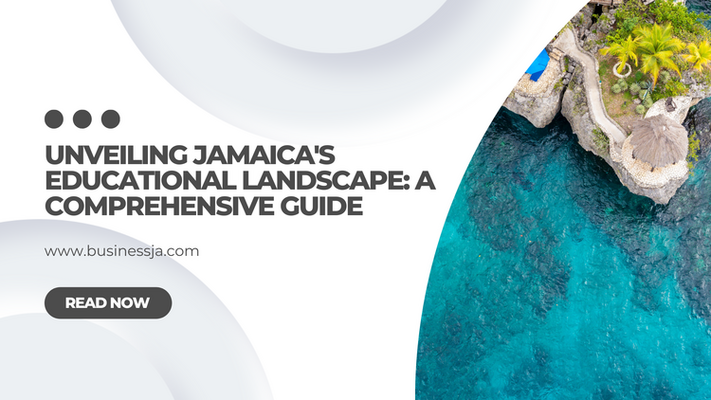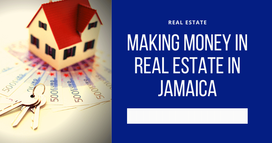
Understanding the Significance of Education
Education is the backbone of any progressive society, playing a pivotal role in ensuring continual progress from one generation to the next. For a government to fulfil its purpose, it must invest in the education of its people. In Jamaica, a robust educational structure is in place, emphasizing the need for a shift in mindset from dependence on the government to collective responsibility for our nation's future. I am speaking of the Vision 2030 objective.
In the Jamaican context, it embodies a robust educational system that empowers individuals and propels the nation towards sustainable development. This comprehensive guide delves into Jamaica's Educational landscape, exploring its structure and how it aligns with the Vision 2030 objectives.
The Current Educational Structure in Jamaica
Early Childhood Education
These Early Childhood Education programs in Jamaica encompass Basic, Infant, and Pre-school programs, catering to children aged 1-6. The system; established in 1942, includes over 2,595 facilities categorized as Infant Schools, Basic Schools, Day Care Centers, and Special Education Centers. Vision 2030's commitment to providing quality education from the earliest stages.
Primary Educational Institutions
The Primary School system, fed by Early Childhood institutions, registers children at ages 6-7. It follows a curriculum set by the Ministry of Education, including assessments in various grades and the Primary Exit Profile (PEP) at Grade 6. The curriculum aligns with Vision 2030 goals to ensure a seamless transition, emphasizing literacy, numeracy, and holistic development.
FAQs:
Q1: What programs are included in Early Childhood education?
A1: Early Childhood education includes Basic, Infant, and Pre-school programs for children aged 1-6.
Q2: How many facilities are there for Early Childhood education in Jamaica?
A2: Over 2,595 facilities are spread across Jamaica, including Infant Schools, Basic Schools, Day Care Centers, and Special Education Centers.
Q3: What is the purpose of the Primary Exit Profile (PEP) assessment?
A3: PEP, introduced in Grade 6, replaces the Common Entrance Exam and GSAT, assessing students in Math, English, Social Studies, Communication Tasks, and Science.
FAQs:
Q1: How does Early Childhood Education align with Vision 2030?
A1: Early Childhood Education is integral to Vision 2030, ensuring that every child receives a strong foundation for future academic and personal growth.
Q2: What is the role of Primary Education in achieving Vision 2030 objectives?
A2: Primary Education serves as the gateway to achieving Vision 2030 goals by focusing on essential skills and knowledge.
Cost Of Education in Jamaica
Formal education for children in Infant Schools, Basic Schools, Day Care Centers, and Special Education Centers is free for six years of primary education, as mandated by a government bill. And this aligns with Vision 2030's vision of inclusivity and accessibility.
The Primary School System
In the Primary School system, subjects include English, Religious Education, Arts & Crafts, Math, Spanish, Physical Education, and Computer Studies. Class teachers typically cover all subjects, focusing on interactive methods rather than traditional lectures. The system not only imparts knowledge but instils a sense of responsibility and discipline. Vision 2030 recognizes the primary years as crucial for nurturing well-rounded individuals who contribute positively to society.
FAQs:
Q4: Is primary education free for all children in Jamaica?
A4: Yes, the government has implemented a bill ensuring free and compulsory education for children within the primary school system.
Q5: What subjects are taught in the Primary School system?
A5: Subjects include English, Religious Education, Arts & Crafts, Math, Spanish, Physical Education, and Computer Studies in some schools.
FAQs:
Q3: How does the government's bill for free primary education contribute to Vision 2030?
A3: The bill aligns with Vision 2030's goal of ensuring access to quality education for all, promoting inclusivity.
Q4: How does the Primary School system prepare students for the future?
A4: The system focuses on holistic development, preparing students with essential skills for the challenges outlined in Vision 2030.
Transformation in the Educational System
The Ministry of Education, Youth, and Information in Jamaica is working on transforming the education system into a 'mass customization' format, departing from traditional 'generalized education.'
Source: JIS Report
Secondary Education in Jamaica
After completing the PEP assessment, students move on to Secondary or High Schools, categorized into Lower School (Forms 1-3), Upper School (Forms 4-5), and Sixth Form (Grades 12 & 13).
Secondary education, a vital phase in the educational journey, prepares students for the challenges outlined in Vision 2030. Categorized into Lower School (Forms 1-3), Upper School (Forms 4-5), and Sixth Form (Grades 12 & 13), this phase offers diverse subjects aligned with Vision 2030's emphasis on knowledge diversity.
Lower School
Lower School provides formal education in various subjects, including Mathematics, English, Spanish, French, Integrated Science, History, Geography, Religious Education, Physical Education, Technical Drawing, and more.
Upper School
Forms 4-5 allow students to choose subjects for the Caribbean Examination Council Examination (CSEC), equivalent to the British O'Levels. And this promotes specialization and aligns with Vision 2030's vision of expertise.
Sixth Form
Grades 12 & 13 comprise the Sixth Form, where students pursue the highest achievements in their chosen subjects, taking the CAPE Caribbean Advanced Proficiency Exams, equivalent to British A'Levels.
FAQs:
Q6: What subjects are offered in the Secondary School system?
A6: Subjects include Mathematics, English, Spanish, French, Integrated Science, Physics, Biology, Chemistry, History, Geography, Religious Education, Physical Education, Technical Drawing, Principles of Business, Food & Nutrition, Home Economics, and more.
Q7: How do students choose subjects in Upper School?
A7: Students in Forms 4-5 start choosing subjects for the Caribbean Examination Council Examination (CSEC).
FAQs:
Q5: How does Secondary Education contribute to Vision 2030's vision?
A5: Secondary Education aligns with Vision 2030 by fostering specialization and advancing proficiency, preparing individuals for leadership roles.
Q6: How does Sixth Form align with Vision 2030's goals?
A6: Sixth Form focuses on advancing proficiency through Caribbean Advanced Proficiency Exams (CAPE), contributing to Vision 2030's vision of a knowledgeable society.
Tertiary Level Education in Jamaica
T
ertiary-level education in Jamaica is contingent on passing CAPE exams. Admission to universities typically requires A-Levels or CAPE examinations. Several institutions, including universities and colleges, provide diverse academic opportunities.
FAQs:
Q8: What qualifications are required for entry into Jamaican universities?
A8: A-Levels or CAPE examinations are generally required for admission to universities in Jamaica.
Q9: Are there part-time programs in Jamaican universities?
A9: Some universities in the United States offer extension programs in various parts of Jamaica, catering to working professionals seeking continued education.
FAQs:
Q7: How does Tertiary Level Education align with Vision 2030?
A7: Tertiary Level Education contributes to Vision 2030 by producing a highly skilled workforce through diverse academic opportunities.
Q8: What role do A-Levels or CAPE examinations play in realizing Vision 2030 ambitions?
A8: These examinations ensure a high standard of education, preparing individuals for various careers and contributing to Vision 2030's goal of economic growth.
Listings of Tertiary Level Institutions in Jamaica
University of the West Indies at Mona
University of Technology (U-Tech)
Excelsior Community College (EXED)
Northern Caribbean University (NCU)
International University of the Caribbean (IUC)
University of the Commonwealth Caribbean (UCC)
Edna Manley College of the Visual and Performing Arts
College of Agriculture, Science and Education (CASE)
G. C. Foster College of Physical Education and Sports
Moneague College
All American Institute of Medical Sciences, Black River, St. Elizabeth (AAIMS)
Teacher training colleges
The Mico University College, Cross Roads, Kingston
Shortwood Teachers' College, Shortwood, St. Andrew
Bethlehem Teachers' College, Malvern, St. Elizabeth
Moneague College, Moneague, St. Ann
Church Teachers' College, Mandeville, Manchester
Sam Sharpe Teachers' College, Montego Bay, St. James
St. Joseph's Teacher's College, St. Andrew
Catholic College of Mandeville, Mandeville, Manchester
Saint John's College (School of nursing)
14 community colleges
One dental auxiliary School
One vocational training development institute
29 vocational training centres, and
Six-6 human employment and resources training (HEART) vocational training institutions.
Conclusion
Jamaica's educational landscape is diverse and offers a range of opportunities for students at every level. The focus on transforming the education system ensures a dynamic and evolving approach to learning, preparing individuals for a globally competitive world.
As outlined in Vision 2030, it positions the nation as a hub of knowledge, innovation, and economic prosperity. As the educational landscape evolves, the journey towards fulfilling this vision continues, shaping a brighter future.





